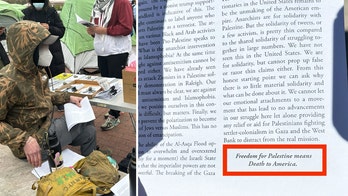ARTESIA, N.M. (AP) – A detention center being opened in southeastern New Mexico to deal with the surge in women caught crossing illegally with children into the U.S. from Central America will be focused on deporting the immigrants quickly, officials said Thursday.
During a media tour of the austere barracks at a federal law enforcement training center turned immigration jail, a senior U.S. Immigration and Customs Enforcement official said the goal is to process the immigrants and have them deported within 10 to 15 days to send a message back to their home countries that there are consequences for illegal immigration. The official spoke on condition of anonymity because he was not allowed to talk publicly citing agency policy.
About a month ago, border patrol agents were suddenly overwhelmed by thousands of Central American immigrant children and women seeking to enter the U.S. Because officials had run out of room at holding facilities, they began releasing immigrant families and requiring them to report back within 15 days.
With this new facility, women found crossing with children will not be released, but held and quickly processed, a step toward returning the department to its policy of not releasing families and deporting those who don't have permission to enter the U.S. legally.
Artesia Mayor Phillip Burch said he was told by federal officials that the detention center will likely be in operation for six months to a year, although he thinks it could stay open longer than that.
Last week, the Obama administration announced plans to convert the Federal Law Enforcement Training Center into one of several temporary sites being established to deal with the influx of women and children fleeing gang violence and poverty in Central American.
Border Patrol agents have apprehended more than 52,000 immigrant children crossing the border alone since October.
President Barack Obama has called it a humanitarian crisis, warning parents of the dangers of sending children with smugglers.
"Do not send your children to the borders," he said in an interview with ABC's George Stephanopoulos on Thursday. "If they do make it, they'll get sent back. More importantly, they may not make it."
The Artesia center will only house children caught traveling with their mothers or other female relatives. Unaccompanied minors will continue to be turned over to the Department of Health and Human Services.
The center will hold nearly 700 people in a barracks-style setting, with 30 rooms per building, four bunk beds per room. Each of the three buildings will have one room as playground and one for medical staff.
The buildings have a refrigerator that will be stocked with water, milk and fruit so the children will be able to eat whenever they want. There will be toys, video games and televisions for the kids. And once an 8-foot fence is erected, the children will be allowed to play outside. They may even build a soccer field, the official said.
Some have questioned the amenities, saying they will only encourage immigrants who are desperate for a better life to try to come back.
News of the detention center opening in Artesia has stirred up fear and anger among some residents who worry about possible illnesses, a lack of resources and dramatic changes to this small, close-knit city in the middle of oil and gas country.
Others criticized the federal government's response.
"What we should do is take them to the Air Force base, put them on a plane escorted by two fighter jets and send them back, and come back for the next group," said Collier Allan, 62, who lives near the training center.
Burch said some residents were worried about unvaccinated children and some immigrants possibly trying to escape. But he said federal doctors plan to evaluate all immigrants upon entry and then again 48 hours later to ease concerns over diseases.
The federal agency said all the immigrants will be checked for criminal records, and that the officers who will do the interviews are trained to identify criminals.
Asked if it felt like a new prison was opening up in the city, Burch said "to some degree."
"But the people here are women and children ages infant to 17. They are not hardened criminals," he said.
Follow us on twitter.com/foxnewslatino
Like us at facebook.com/foxnewslatino




